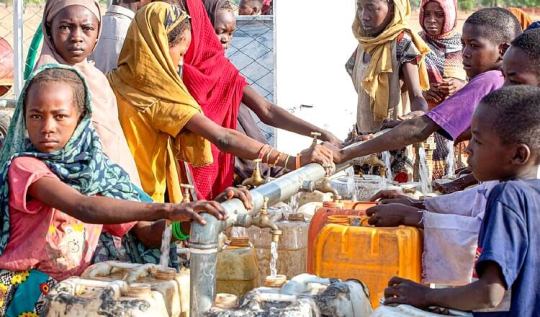#globalhumanitarianorganizations
Explore tagged Tumblr posts
Text
Sudan Famine Crisis Demands Urgent Aid

The scale of the famine in Sudan is staggering. Over 18 million people are acutely hungry, and 3.6 million children are acutely malnourished. These children are at extreme risk, being 10 to 11 times more likely to die than those who have enough to eat. Despite the soaring needs, humanitarian aid efforts are hampered by systematic obstructions and deliberate denials of access by parties to the conflict. According to a joint statement from 19 global humanitarian organizations, without rapid and large-scale aid, more people will die.
Obstacles to Aid Delivery
The delivery of humanitarian aid in Sudan is fraught with challenges. Aid workers face significant dangers, including being killed, injured, and harassed. Humanitarian supplies are often looted, and access to key areas has been severely restricted. For instance, movements across conflict lines to parts of Khartoum, Darfur, Aj Jazirah, and Kordofan have been cut off since mid-December. In March and April alone, nearly 860,000 people were denied humanitarian aid in these regions. Region Population Denied Aid (March-April) Khartoum 300,000 Darfur 250,000 Aj Jazirah 180,000 Kordofan 130,000 The situation is particularly dire in North Darfur’s capital, El Fasher, where intensified fighting has left around 800,000 civilians bracing for an imminent large-scale attack. Medical facilities, displacement camps, and critical civilian infrastructure have been targeted, leaving parts of the city without electricity and water.
Impact of the Conflict on Famine
The ongoing conflict in Sudan has exacerbated the famine crisis. Disruptions to food production and distribution systems have left millions without access to basic necessities. The warring factions' control over key areas further impedes aid efforts, making it incredibly difficult to reach those in desperate need. Efforts and Successes in Aid Delivery Despite these challenges, there have been some positive developments in aid delivery. The UN World Food Programme (WFP) recently managed to transport 1,200 metric tonnes of food supplies for 116,000 people across the Darfur region from Chad through the Tine border crossing. This success underscores the critical importance of maintaining and expanding access points for humanitarian aid. In Central Darfur, WFP convoys have successfully delivered aid to Umshalaya and Rongatas, while convoys destined for South Darfur, including displacement camps in Nyala, are still in transit. These efforts provide a glimmer of hope amid the broader crisis. Calls for Action Humanitarian organizations are urging the warring parties to protect civilians and facilitate humanitarian access. However, they have called for a nationwide ceasefire to ensure that aid can be delivered safely and effectively. Furthermore, the heads of these organizations have emphasized the need for the Sudanese Armed Forces (SAF) and the Rapid Support Forces (RSF) to resolve their differences without resorting to violence, which continues to kill, maim, and displace hundreds of thousands of people. Moreover, they have stressed that a peaceful resolution is crucial to prevent the situation from deteriorating further. Additionally, they have urged both sides to prioritize the safety and well-being of civilians, who are bearing the brunt of the conflict. Consequently, humanitarian organizations are calling for immediate and unfettered access to provide essential aid and assistance to those in need. Pledges at the International Humanitarian Conference Additionally, there is an urgent need for increased international support. At the International Humanitarian Conference for Sudan and its Neighbors held in Paris on April 15, pledges were made to support the crisis. However, nearly five months into the year, the humanitarian appeal for Sudan remains only 16 percent funded. Humanitarians are calling on donors to urgently disburse the pledged funds to address the growing needs. International Response and Funding Needs The international community’s response has been crucial but insufficient. With the humanitarian appeal for Sudan at a mere 16 percent of the required $2.7 billion, the shortfall in funding is alarming. This gap severely limits the ability to scale up aid operations and meet the urgent needs of millions of Sudanese. To achieve sustainable solutions and mitigate the crisis, the international community must: - Increase funding for humanitarian efforts. - Support conflict resolution initiatives. - Strengthen institutions to facilitate aid delivery. Conclusion The situation in Sudan is dire, with millions at risk of famine due to ongoing conflict and restricted aid access. Immediate and concerted efforts from the international community, combined with a commitment from the warring parties to cease hostilities and allow humanitarian access, are essential to prevent further catastrophe. The time to act is now, and the world must not ignore the suffering in Sudan. Sources: THX News, Wikipedia, & United Nations. Read the full article
#Aiddelivery#conflictinSudan#famineinSudan#FoodInsecurity#globalhumanitarianorganizations#thxnews#Humanitarianaid#malnutritioninSudan#Sudanhungercrisis#UNWorldFoodProgramme
0 notes